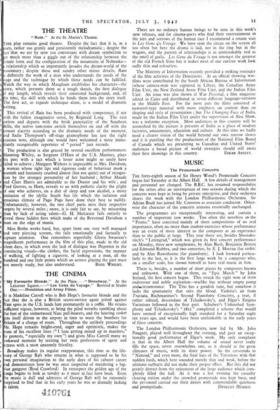THE CINEMA
'My Favourite Blonde." At the Plaza. "Broadway." At the
Leicester Square.—" Les Gens du Voyage." Revived at Studio One.—Dominion and Army Films.
r is Madeline Carroll who is Bob Hope's favourite blonde and the act that she is also a British secret-service agent pitted against azi spies in the U.S. lands him prematurely in a coffin. He retains ufficient vigour, however, to bring the piled wreaths tumbling about he feet of the embarrassed Nazi pall-bearers, and the heaving casket eta itself driven to the airport in time to warn the bombers for ritain of a change of route. Throughout the unlikely proceedings . Hope remains bright-eyed, eager and optimistic, makes the oat of his excellent lines ("I hate getting mixed up in murders," e protests, "especially my own ") and gives Miss Carroll many an wkward moment by treating her twin professions of agent and ctress with a most unseemly frivolity.
Broadway makes its regular reappearance, this time as the life- tory of George Raft who returns in what is supposed to be his wn personal imagination to the early days of his cabaret career nd demonstrates how he was once suspected of murdering a big- hot gangster (Brod Crawford). In retrospect the golden age of the angs begins to look as tawdry as it must in fact have been. Even e music is dull and admirers of George Raft will be extremely urprised to find that in his early years he was so dismally lacking talezIL There are no ordinary human beings to be seen in this week's new releases, and for cinema-goers who find their entertainment in the joys and sorrows of the human race I recommend a return visit to Les Gens du Voyage. We have seen the circus on the screen all too often but here the drama is laid, not in the ring but in the wagons, and the pattern of relationships is as unmistakably real as the smell of garlic. Les Gens du Voyage is not amongst the greatest of the old French films but it makes most of our current work look sadly thin and colourless.
The Ministry of Information recently provided a striking reminder of the film activities of the Dominions. At an official showing war- films were contributed by the South African Bureau of Information (whose camera-man was captured in Libya), the Canadian Army Film Unit, the New Zealand Army Film Unit, and the Indian Film Unit. An issue was also shown of War Pictorial, a film magazine edited in Cairo and distributed in seven different language-versions in the Middle East. For the most part the films consisted of newsreel-type material with more emphasis on content than on shaping and style of presentation ; but The Changing Face of India, made by the Indian Film Unit under the supervision of Alex Shaw, was a welcome exception. Most audiences in this country will be astonished by the picture it presents of India as a place of modern factories, amusements, education and culture. At this time we badly need a clearer vision of the world beyond our own narrow shores and it is puzzling that the productions of the National Film Board of Canada which are presenting to Canadian and United States' audiences a broad picture of world strategies should still await their first showings in this country. EDGAR ANSTEY.


























 Previous page
Previous page